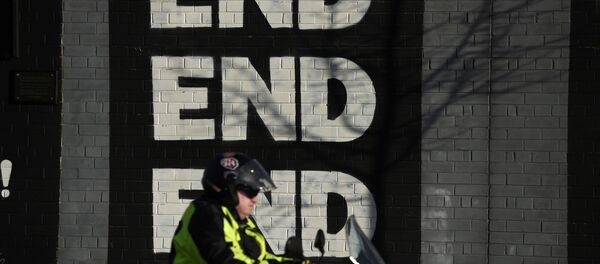What this means is that before the Government can invoke Article 50, the Prime Minister, Theresa May, will now have to seek and obtain the authorization of Parliament. It opens the possibility of a majority of parliamentarians voting against the process being triggered, though at this stage it is unlikely they would do so. It does require, however, that the Prime Minister publish her plans for the negotiations with Brussels on the terms of Brexit — i.e. whether she will be seeking to retain membership of the single market, membership of the customs union, her intentions when it comes to the status of the 3 million EU citizens who currently reside and work in the UK, and so on.
UKSC confirms (by majority of 8:3) that an Act of Parliament is needed before Article 50 can be triggered 1/2 https://t.co/QUny4FUZIr
— UK Supreme Court (@UKSupremeCourt) January 24, 2017
As many have pointed out, leaving the single market will have a deleterious impact on the nation's economy, businesses and jobs, given that we are talking the largest tariff-free market in the world, one that is currently the single largest destination for UK exports and source of its imports.
It reveals a democratic deficit when it comes to the Tory government's determination to rip both Scotland and Northern Ireland, where a majority of people also voted to remain, out of the EU and even the single market against their expressed will. This is where the second part of the Supreme Court's ruling that that the Westminster government is not constitutionally obliged to consult the UK's various devolved governments on the terms of Brexit has huge consequences for the ability of the UK to survive.
Nicola Sturgeon, leader of the Scottish National Party, said that the Supreme Court's ruling "raises fundamental issues above and beyond that of EU membership. Is Scotland content for our future to be dictated by an increasingly right-wing Westminster government with just one MP here, or is it better that we take our future into our own hands? It is becoming ever clearer that this is a choice that Scotland must make."
.@NicolaSturgeon comments on the UK Supreme Court’s ruling today. pic.twitter.com/6QBtSpVbC7
— The SNP (@theSNP) January 24, 2017
Those who deny the case for Scottish independence based on the argument that the EU referendum was conducted on a UK-wide basis, fail to appreciate that the UK has no independent existence outside of its individual member states, while those member states do have an independent existence outside the UK. It is why it is factually incorrect to assert that the UK voted to leave the EU. Rather it was England and Wales that voted to leave the EU, while Scotland and Northern Ireland voted to remain.
When it comes to Northern Ireland, Brexit has placed the 1998 Good Friday Agreement, which brought three decades of conflict in the region to an end, in jeopardy. At a time when the Six Counties finds itself plunged into a political crisis of its own with the resignation of Sinn Fein's Martin McGuinness as Deputy First Minister, in protest at the refusal of First Minister, Arlene Foster, to resign over her role in a controversial renewable energy scheme (a renewable energy scam according to the First Minister's detractors), Brexit brings with it the prospect of a hard border being reintroduced between Northern Ireland and the Irish Republic, an EU member state, after three decades.
As Sinn Fein President Gerry Adams warned recently, "The British Government's intention to take the North out of the EU, despite the wish of the people there to remain, is a hostile action. Not just because of the implications of a hard border on this island but also because of its negative impact on the Good Friday Agreement."
Adams continued: "The British Prime Minister repeated her intention to bring an end to the jurisdiction of the European Court. Along with her commitment to remove Britain from the European Convention on Human Rights this stand threatens to undermine the fundamental human rights elements of the Good Friday Agreement."
Remain vote in the north must be upheld and defended — @GerryAdamsSF https://t.co/PgMhwqetZE pic.twitter.com/cEeUhPEikA
— Sinn Féin (@sinnfeinireland) January 24, 2017
Shorn of the embroidery that a vote for Brexit was a vote to restore democracy and full sovereign rights to the UK parliament, in reality Brexit is the UK manifestation of the rise of the far right across Europe in recent years.
The main issue driving Brexit is immigration, unleashing similar ugly anti-migrant and anti-minority sentiment across parts of the country similar to that unleashed in the US by the election of Donald Trump as President. In the process we have witnessed the ideological collapse of a large section of the left, succumbing to the narrative that migrants and free movement rather than neoliberalism and austerity are responsible for the housing crisis, lack of investment in public services, low wages and the erosion of conditions in the workplace.
It has revealed a widening chasm in political cultures across the UK, to the point where many in Scotland, myself included, now welcome the prospect of the opportunity to campaign for and vote to remain in the 21st century as part of an interdependent Europe, rather than join England and Wales on their journey back in time to the 19th century.
The views expressed in this article are solely those of the author and do not necessarily reflect the official position of Sputnik.




